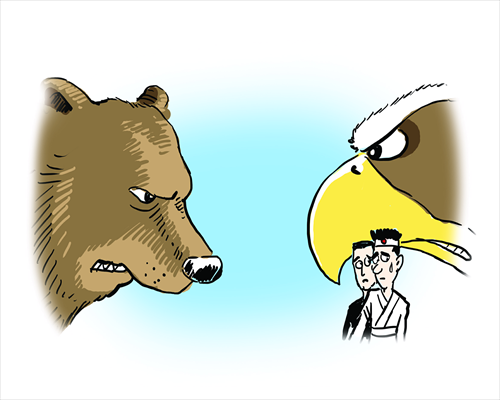HOME >> OP-ED
Crimea sanctions pricy for Tokyo and Seoul
Source:Global Times Published: 2014-3-30 22:38:03

Illustration: Liu Rui/GT
The Ukraine crisis was high on the agenda on the third Nuclear Security Summit last week in The Hague, the Netherlands. US President Barack Obama and leaders of major Western countries agreed to exclude Moscow from the G8, and adopted the Hague Declaration calling for harsher sanctions against Russia in light of its moves in the Crimean peninsula.
Meanwhile, the Dong-A Ilbo, a leading newspaper of South Korea, published an editorial calling for a value alliance among Washington, Tokyo and Seoul to deal with a "strong" Russia in a "new Cold War era."
By now, the theory that we are entering into a new Cold War era driven by the confrontation between the US-dominated alliance and Russia is becoming prevalent.
The editorial suggested that "Seoul has to not only make a careful judgment about the situation but also has to align itself with its allies, with whom it shares the values of liberal democracy, market economy and human rights." But the author failed to recognize the real national interests of South Korea and the changing international tapestry.
South Korea is gridlocked regarding whether to join the US sanctions. Foreign ministry spokesman Cho Tai-young announced "Nothing has been decided." Though facing tacit pressure from Washington, Seoul is unlikely to impose substantial sanctions against Moscow.
For one, Russia would probably endorse North Korea in a myriad of ways if the South joins the sanctions.
Korean reunification has long been topping the agenda of Seoul. But Pyongyang fired two medium-range ballistic missiles into the Sea of Japan early Wednesday, further upsetting the South.
If Moscow chooses to back Kim Jong-un's government to help boost its parallel development of economy and nuclear forces, Seoul would have increasing difficulty in implementing the blueprint for unification proposed by President Park Geun-hye. For another, joining the US will also derail Park's Northeast Asia Peace and Cooperation Initiative.
South Korea has a lot of economic stakes in Russia. In recent decades, Washington has only been able to provide security guarantees like the nuclear umbrella for Seoul, which has been seeking for vast market and energy supply from its neighbors to beef up the domestic economy.
That's why it has signed trading pacts and launched a spectrum of cooperation projects with Russia.
Unlike Seoul, Tokyo, another staunch ally of Washington in Asia, has announced sanctions following its Western allies in the wake of Russia's move, including a suspension of negotiation on relaxing visa regulation and consultation on agreements covering military, investment and space. But these are only slight moves.
Tokyo, which has been embroiled in a simmering territorial dispute with Moscow over a chain of uninhabited islands, the Southern Kuril Islands, has been seeing improved ties owing to its Prime Minister Shinzo Abe's effort. Abe has met Russian President Vladimir Putin more than any other leader since he returned to power in December 2012.
A deteriorating relationship between the two neighbors also jeopardizes Japan's interests in Russia and in particular the Far East. Economic and energy diplomacy have brought the two countries closer.
Tokyo concluded a pact with one of Russia's prestigious petroleum corporations to jointly develop seabed oil fields in the Sea of Okhotsk in May 2013. The project may be postponed permanently and consequently cause immense loss for Japan, if the Abe administration imposes tougher sanctions against the Kremlin.
Therefore, it is in the interests of neither Seoul nor Tokyo to impose rigorous sanctions over Putin's maneuvers in Crimea. And it seems impossible for the two countries to build mutual trust cooperate, though Park and Abe met face to face for the first time since they assumed power at the sidelines of the summit in The Hague at the mediation of Obama.
The US president would like to see collaboration between the two US allies to sanction Russia and facilitate its "pivot to Asia" policy. But this may not be easy.
The article was compiled by Global Times reporter Wang Xiaonan, based on an interview with Zhao Kejin, associate professor with the Department of International Relations, Tsinghua University. wangxiaonan@globaltimes.com.cn
Posted in: Viewpoint